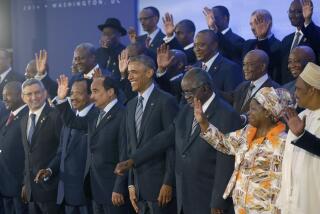Southern Africa’s Future
- Share via
International negotiations to implement independence for Namibia and end the guerrilla war in Angola will continue in New York on Monday after yet another round of inconclusive but helpful conversations, this time in Cairo. The commitment to continued peace efforts is all the more important as the military risks rise.
South Africa participated in the Cairo talks, as it had earlier in Europe and in the Congo, and there were reports of satisfaction among officials in Pretoria, more accustomed to isolation than to a central international role.
The linkage of Namibian independence with Angola was an invention of the Reagan Administration in its determination to rid Angola of the Cuban troops that have supported the nation since it won its independence. The problem has been complicated as the United States has plowed millions of dollars in arms to guerrillas fighting the government of Angola, while South African troops have become increasingly engaged in the battle at the side of the guerrillas. The Cubans have become more essential than ever to the survival of the Angolan government and have recently been increased by about 10,000 to a total of about 45,000. That buildup, and the new deployment of the Cubans in southwest Angola near the Namibian frontier, has alarmed South Africa and led to a call-up of South African reserves.
At the Cairo talks there was direct participation by the United States, Angola and Cuba as well as South Africa. The principal accomplishment was “to define the parameters of a settlement,” according to Chester Crocker, assistant secretary of state for Africa. There was also progress “in attitude and procedure,” a State Department official commented, adding that “gaps in substance remain that can be bridged only by political decisions that have not yet been taken.”
Among the decisions yet to be taken is a real commitment by South Africa to end its control over Namibia. The increased repression enforced in recent days in Namibia raises profound questions about South Africa’s sincerity in living up to its promise to implement the United Nations plan. But also lacking is an Angolan commitment to conciliation with the UNITA guerrillas of Jonas Savimbi. The reinforcement of Cuban troops after a Soviet-backed offensive failed last autumn, and the attack on South Africans guarding the Calueque Dam, suggests that the Angolans still hope for a military solution rather than accommodating Savimbi’s substantial following.
These talks parallel two other interesting initiatives of the South Africans on domestic and regional issues.
Within South Africa the government is seeking parliamentary approval of a new negotiating body that would include some blacks. The concurrence of the racially segregated white, Indian and mixed-race houses of parliament is being sought--an exercise not likely to stir confidence among the black majority, which has no voice in parliament. The proposal to involve the blacks in direct negotiations still has a hollow ring to it as the government continues to deny many of the most influential blacks a voice. Concerns among the black majority have been heightened by new legislation allowing limited integrated housing but basically toughening racial segregation through an amended group-areas act.
South Africa has taken steps to repair the 1984 Nkomati accords with Mozambique, which had been marred by shocking violations by the South Africans. South Africa finally seems to be ending its clandestine support of the murderous RENAMO bandits operating in Mozambique. And there now is a serious effort to restore the Cahora Bassa Dam in Mozambique to full service as a crucially important source of electric power for both Mozambique and South Africa. Implicit in that would be cooperation by Pretoria in the international effort to control RENAMO.
The pariah role in which South Africa finds itself is of its own making. The efforts to reform apartheid have not won world approval because they fail to address the fundamental injustice that denies basic rights to the black majority. The campaigns of violence and destruction waged by South Africa against neighboring nations, ostensibly in the name of self-defense against guerrillas of the African National Congress, have brought widespread opprobrium. The Angola-Namibia talks can nevertheless serve as a measure of where it is that South Africa is going, and whether its talk of change has validity.
More to Read
Sign up for Essential California
The most important California stories and recommendations in your inbox every morning.
You may occasionally receive promotional content from the Los Angeles Times.













